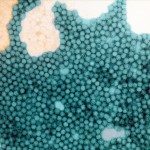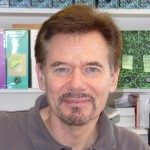Link to Pubmed [PMID] – 2174061
J. Cell. Physiol. 1990 Nov;145(2):207-16
The proto-oncogene c-myc and the oncogene SV40T, both of which have been implicated in the process of cellular immortalization in vitro, have been introduced via amphotropic retroviral expression vectors into the human mammary epithelial cell (HMEC) line 184A1N4 (A1N4). Two stable cell lines were established by growth in selective medium and were found to overexpress either c-myc (A1N4-myc) or SV40T antigen (A1N4-T). Neither the A1N4, A1N4-myc, or A1N4-T cells will grow in soft agar or form tumors in nude mice. However, A1N4-T or A1N4-myc cells, but not the parental A1N4 cells, form colonies in soft agar in response to either epidermal growth factor (EGF), transforming growth factor alpha (TGF alpha), or basic fibroblast growth factor (bFGF). Like EGF and TGF alpha, bFGF is moderately mitogenic for the anchorage-dependent growth (ADG) of all three cell lines. Further, co-cultivation of A1N4-T or A1N4-myc cells with primary diploid mammary fibroblasts can also induce the anchorage-independent growth (AIG) and stimulate the ADG of A1N4-T or A1N4-myc. In addition, conditioned medium obtained from these mammary fibroblasts also stimulated the AIG of the A1N4-T and A1N4-myc cells and was found to contain immunoreactive TGF alpha and bioactive FGF. The mammary fibroblasts express specific mRNA transcripts for bFGF and acidic FGF (aFGF). These results suggest that growth factors such as TFG alpha or FGF, which may be derived from the adjacent mammary stroma, might influence in a paracrine manner the phenotypic characteristics of a population of human mammary epithelial cells toward transformation.

